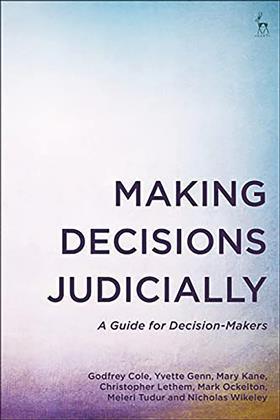Framework for understanding 'letters to the losers'
Making Decisions Judicially: A Guide for Decision-Makers
Godfrey Cole, Yvette Genn, Mary Kane, Christopher Lethem, Mark Ockelton, Meleri Tudur, Nick Wikeley
£24.99, Hart Publishing
★★★★✩
Books on judicial decision-making are essential reading for those who write judgments and for the rest of us who read them.
Decisions of courts and other bodies need to be fair, clear and understandable. The party who is successful needs a clear decision that may need to be enforced; the party that came second needs to understand the reasons for the decision, so they can take any necessary action, including a possible appeal. Court judgments have been described as a ‘letter to the loser’, and so they are.
There has been considerable training for judges in recent years on this subject, partly driven by an interest in making courts accessible to all parties, including vulnerable witnesses, and an increase in unrepresented litigants. There are innovations in making these decisions understandable to all concerned.
This book is the combined work of several experienced trainers and writers with diverse backgrounds and judicial experience. It covers the work of courts, tribunals, and quasi-judicial bodies such as professional regulators.

It is not always easy making the right decision for the right reasons and then explaining why on paper. Judges and others work under considerable pressure, and deal with parties who themselves are under stress and often in situations which are unfamiliar to them. It is no surprise that not all decisions are perfect. The professional’s role is to analyse the decisions and advise the client – and we need a framework in order to do that.
This book analyses the whole process of decision-making, including communication and vulnerable witnesses, how to have a fair hearing, case preparation, and making and communicating the decision. Judges should avoid facial expressions which can lead to misunderstandings.
There is an interesting focus on ethics and – something new to me – the Bangalore Principles of Judicial Conduct. These comprise six core values: independence, impartiality, integrity, propriety, equality, and competence and diligence. The Bangalore Code of Judicial Conduct was drafted in 2000, discussed by senior judiciary from over 75 countries over the next few years and later adopted, as the Bangalore Principles, by the United Nations Social and Economic Council.
The impact of Covid and subsequent technological developments will change courts. Another innovation is the idea of Ground Rules Hearings. These started in criminal courts to identify any accessibility and vulnerability issues, and enable an open discussion to facilitate the best evidence and full participation of witnesses.
There are also excellent sections on judge-craft and good style.
David Pickup is a partner at Pickup & Scott Solicitors, Aylesbury































No comments yet